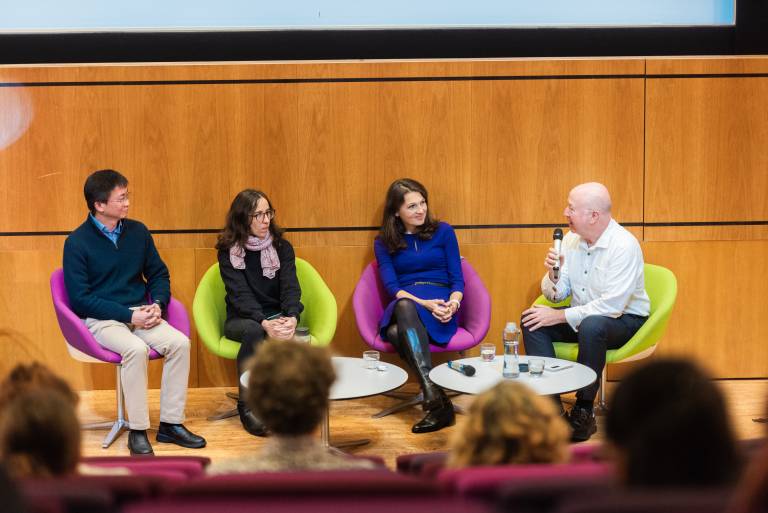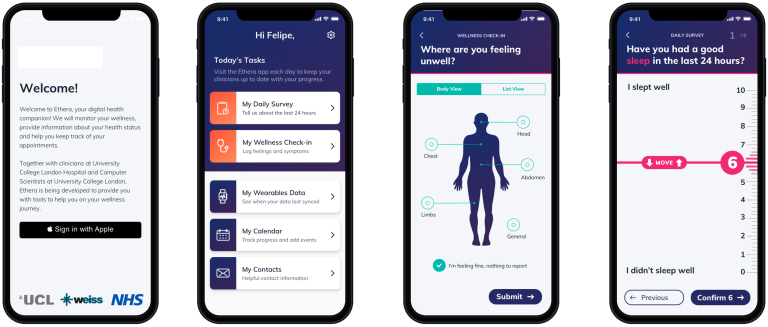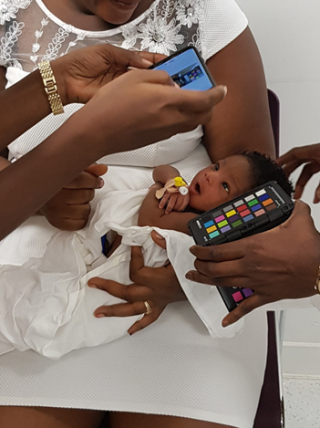IHE Symposium 2023: Commercialising research
3 November 2023

Professor Ivana Drobnjak, Professor of Computational Healthcare in the Department of Computer Science, UCL
'Halo-X Digital Monitoring for monitoring health at home'
Professor Ivana wanted to do more than write grant funding. Like many, she found funding to be an issue in academia and so she went down the commercial route.
She initially started by creating lots of algorithms but none of them ended up in the clinic so she asked a clinician what they actually needed. After speaking to clinicians, she learnt that the first 30 days were extremely critical for the patient. 30% come back in those 30 days because of infections or other complications so this readmission was costly for the NHS and for the patient.
Normally these patients would be monitored by nurses but as we saw during Covid, this wasn’t always feasible and so Professor Ivana and her team created an app that asked the same questions a clinician would ask. The answers to these questions were sent to a clinician who vetted whether the patient needed to see a GP or go back to the hospital if anything was flagged.

The device was simple as, during feedback, the team found that people didn’t like using a range of devices. It was just a watch with a sensor for heart rate monitoring and a pedometer to count steps. This was effective because the heart rate of a person who wasn’t recovering well was practically tachycardiac and they would barely be walking and the sensors, along with the question on the app would have picked this up.
Lastly, one of the things Prof Ivana found was that engaging clinicians and patients was fundamental in making Halo-X successful.
Barry Shrier, Founder of Giant Health
Barry starts his talk off with a comical video of him talking using AI and mentions that soon we won’t be able to tell the difference between AI generated videos and real-life ones.
With these feats, there’s been a lot of interest in healthcare technology and diagnostics, with benefits for patients, providers, and industry. But Barry notes something we’ve heard a lot during this symposium – the tech is more likely to be successful if it’s catered to the patient – if it leads to less admin, faster diagnosis etc.
Dr. Terence Leung, Associate Professor in Biomedical Opticsin the Department of Medical Physics and Biomedical Engineering
'Preparing a smartphone healthcare app for commercialisation'
Dr. Terence Leung and his team have created an app, known as the neoSCB app (neonatal Scleral-Conjunctival Bilirubin), to check for significant jaundice (the high concentration of bilirubin accumulated in the blood due to the inability of the liver excreting bilirubin). Normally a baby would be sent to the hospital to get confirmation of severe jaundice with a blood test but it’s hard for a visiting midwife to spot severe jaundice and make a correct referral, especially if it’s a mild form (unnecessary referral) or if the baby is of a darker skin colour (missed referral).
Dr. Terence Leung and his team have created a camera app that takes a picture of the baby’s eye, targeting the white part (sclera) - The more yellow the eye, the higher the level of jaundice. This app works with babies of all ethnicities and works with any smartphone which can take photos in the RAW format and so it is also a cost-effective solution.

The team conducted their studies at UCL Hosptials and Ghana, studying 800 newborn babies achieving a high diagnostic accuracy, which is comparable to the more expensive jaundice meter that costs £4300!
Their funding started with UCL’s Global Challenges fund, but a big chunk came from the United States Agency for International Development (USAID) and the NIHR.
One thing Dr. Leung notes is that if you want to get regulatory approval, it’s a long process. You need technical documentation and so on but there are quite a few places get help – more on that below.
Dr. Isabel Van De Keere, Senior Partnerships Manager, Healthcare & Pharma
'Knowing your research from the lab towards commercialisation'
Funding can be hard and one of the biggest challenges is accessing funding to develop the technology to a commercially viable product. But as Dr. Isabel says, collaboration with industry partners for technical support, IP strategy and market knowledge can speed up the commercialisation process. Also, knowing your regulations! Compliance with regulatory frameworks is crucial to bring the product to market and regulatory knowledge is necessary for commercialization but this regulatory approval can be very expensive.
How you can get help from UCL
UCL Innovation & Enterprise, UCL Business Ltd and the Translational Research Office provide a wide range of services to support the translation of research and the commercialisation of research and innovation at UCL. These services include:
- Business development and entrepreneurial support
- Funding opportunities
- Facilitation industry engagement and collaboration
- Identifying strategic partnerships
- Intellectual property protection
- Supporting knowledge exchange
Commercialisation Pathways: IP, licensing, and partnerships
Intellectual property: A strong IP and/or patent portfolio is important for successful commercialisation.
Licensing: Establishing licensing agreements with industry partners enables market access for innovative technologies.
Partnerships: Collaborating with industry partners provides R&D, technical support and market knowledge, accelerating the commercialisation process.
Collaboration with key stakeholders is instrumental in the commercialisation process:
- Tech Transfer offices support academic researchers with commercialisation of research and technologies.
- Industry Partnerships facilitate strategic collaborations, fostering research translation into impactful solutions.
- Support from relevant organisations to ensure effective licensing and commercialisation activities, enabling technologies to reach the market successfully.
During the talk, Isabel gave the example of Odin Vision which assisted doctors in the detection of colorectal cancer. One thing Dr. Isabel did note was that spin outs from UCL brings with it challenges as starting your own company. Another thing she mentioned was that you can’t patent something if it’s already in the public domain eg. If you’ve already talked about it in a presentation.
 Close
Close

